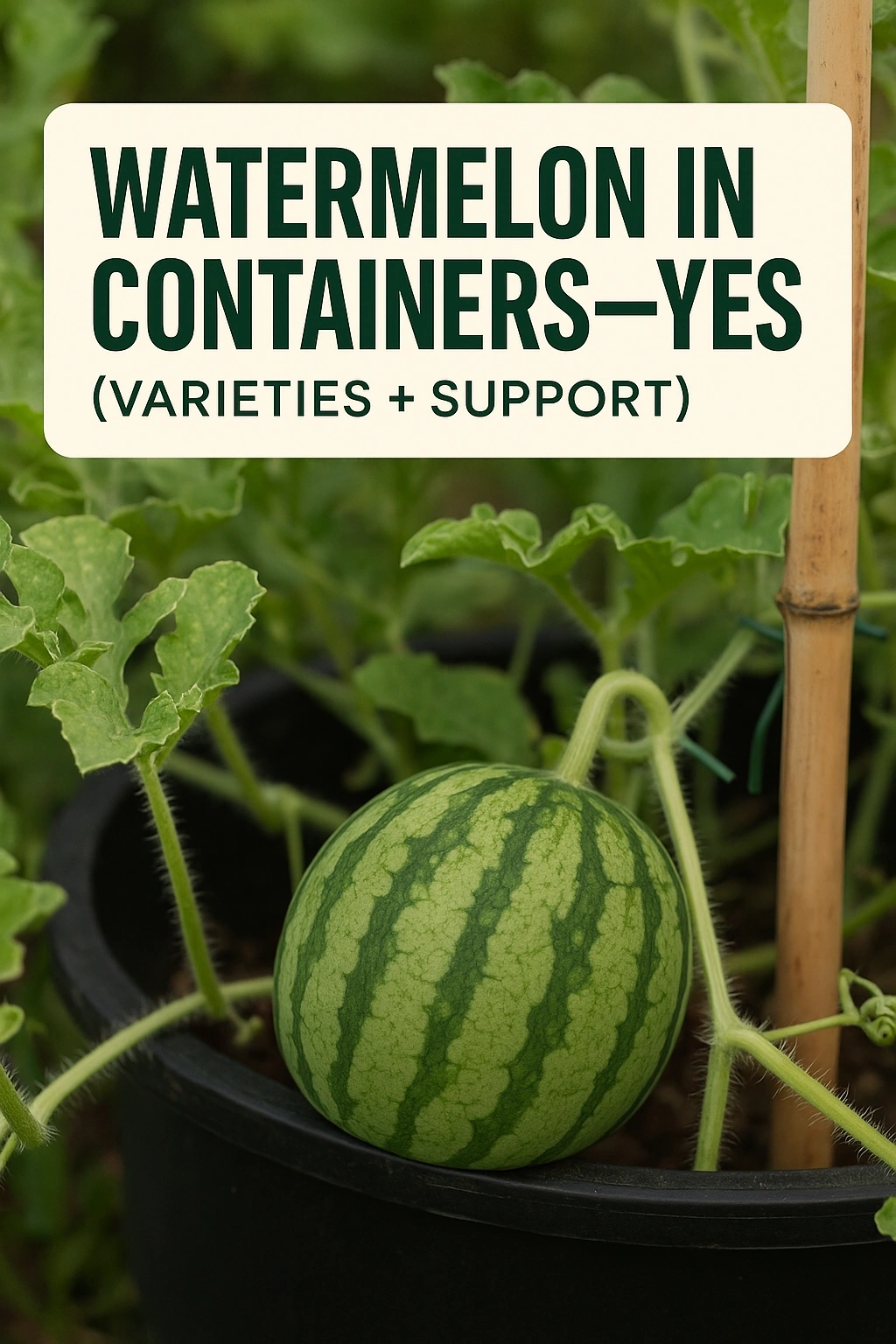
Growing watermelons in containers is not only possible but can also be highly rewarding. With the right varieties and care, you can enjoy sweet, juicy watermelons even in limited spaces. This article explores the best practices for container gardening with watermelons, including suitable varieties, essential care tips, and troubleshooting common issues. Whether you have a small balcony or a spacious patio, discover how you can cultivate this delicious fruit in your own home.
Choosing the Right Container
Selecting the appropriate container is crucial for successful watermelon growth. Watermelons require ample space for their roots to develop, so choose a container that is at least 5 gallons in size. Ideally, opt for larger pots, such as 10 to 15-gallon containers, to allow for robust growth. Ensure the container has drainage holes to prevent waterlogging, which can lead to root rot.
Soil Requirements
The soil you use plays a significant role in the health of your watermelon plants. A well-draining potting mix enriched with organic matter, such as compost, is ideal. Watermelons thrive in slightly acidic to neutral pH levels, so consider testing your soil and adjusting as necessary. A mix that retains moisture yet allows for drainage is vital for optimal growth.
Best Watermelon Varieties for Container Gardening
Not all watermelon varieties are suitable for container gardening. Some grow too large, while others may not produce well in confined spaces. Here are some of the best varieties that thrive in containers:
Miniature Watermelons
- Sugar Baby: This small, round variety produces sweet, dark green melons weighing around 8 to 10 pounds. It matures in about 75 days.
- Garden Baby: Known for its compact growth, this variety yields small, sweet melons perfect for container gardening.
- Sweet Slice: A seedless variety that grows to about 10 pounds, offering a refreshing flavor and smooth texture.
Other Compact Varieties
- Icebox Watermelon: These are smaller melons, typically weighing between 5 to 15 pounds, making them suitable for limited spaces.
- Golden Midget: A unique variety that offers yellow flesh and a sweet flavor, maturing in about 75 days.
Essential Care Tips for Container Watermelons
Successful container gardening requires attention to several key factors that contribute to the growth and health of your watermelon plants.
Watering Practices
Watermelons need consistent moisture, especially during flowering and fruiting stages. Water your plants deeply, ensuring the soil is moist but not soggy. A good rule of thumb is to water when the top inch of soil feels dry. During hot summer months, you may need to water daily or every other day to maintain adequate moisture levels.
Fertilization Strategies
Watermelons are heavy feeders. Use a balanced fertilizer every two to three weeks during the growing season. Look for fertilizers high in phosphorus and potassium to promote flowering and fruit development. Avoid over-fertilizing, as this can lead to excessive foliage growth at the expense of fruit production.
Sunlight and Temperature Requirements
Watermelons thrive in warm, sunny conditions. They require at least 6 to 8 hours of direct sunlight each day for optimal growth. Position your containers in a location that receives ample sunlight and protects them from strong winds. Ideal temperatures for watermelon growth range from 70°F to 90°F (21°C to 32°C).
Supporting Growth
As watermelon vines grow, they may require support to prevent them from sprawling too much. Use trellises or cages to help guide the vines upward. This method saves space and allows for better air circulation, reducing the risk of disease.
Common Issues and Troubleshooting
Container gardening can present unique challenges. Being aware of common issues can help you respond effectively and ensure a bountiful harvest.
Pest Management
Keep an eye out for pests such as aphids, cucumber beetles, and spider mites. Regularly inspect your plants and use insecticidal soap or neem oil if pests become problematic. Encouraging beneficial insects, such as ladybugs, can also help manage pest populations naturally.
Disease Prevention
Watermelons can be susceptible to diseases like powdery mildew and root rot. To prevent these issues, ensure proper air circulation and avoid overhead watering. If you notice any signs of disease, remove affected leaves promptly and consider using fungicides if necessary.
Harvesting Watermelons
Knowing when to harvest your watermelons is essential for enjoying their peak flavor. Look for the following signs:
Indicators of Ripeness
- The tendril closest to the fruit turns brown and dries out.
- The bottom spot where the fruit rests on the ground turns yellow.
- Thumping the melon produces a hollow sound.
Harvesting Techniques
Use a sharp knife or garden shears to cut the watermelon from the vine. Leave a few inches of the stem attached to avoid damage. Handle your watermelons carefully to prevent bruising.
FAQs
Can I grow watermelon in a small container?
Yes, you can grow watermelon in a small container by choosing compact varieties such as Sugar Baby or Golden Midget, which are specifically suited for container gardening.
How often should I water container-grown watermelons?
Container-grown watermelons should be watered deeply when the top inch of soil feels dry, which may be every day or every other day, especially in hot weather.
Do I need to pollinate watermelon flowers?
Watermelons are typically self-pollinating, but you can assist the process by gently shaking the plants or transferring pollen with a small brush if you notice a lack of fruit set.
What is the best fertilizer for container watermelons?
A balanced fertilizer with higher phosphorus and potassium levels is ideal for container watermelons to promote healthy flowering and fruiting.
How long does it take for watermelons to grow in containers?
Container watermelons generally take around 70 to 90 days to mature, depending on the variety and growing conditions.
By following these guidelines, you can successfully grow delicious watermelons in containers, enjoying the fruits of your labor even in limited spaces. Happy gardening!
